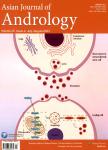Castration-induced expression of caspase-1 in epithelia of accessory sex organs in male rats
Castration-induced expression of caspase-1 in epithelia of accessory sex organs in male rats作者机构:Department of Biosignaling School of Life Science Faculty of Medicine Tottori University Yonago 683-8503 JapanDepartment of Neurobiology School of Life Science Faculty of Medicine Tottori University Yonago 683-8503 JapanDepartment of Biosignaling School of Life Science Faculty of Medicine Tottori University Yonago 683-8503 JapanDepartment of Neurobiology School of Life Science Faculty of Medicine Tottori University Yonago 683-8503 Japan
出 版 物:《Asian Journal of Andrology》 (亚洲男性学杂志(英文版))
年 卷 期:2001年第3卷第2期
页 面:105-108页
核心收录:
学科分类:1001[医学-基础医学(可授医学、理学学位)] 10[医学]
主 题:prostate seminal vesicles tissue involution apoptosis caspase-1 cDNA cloning castration epithelium rats
摘 要:Aim: As an attempt to clarify the molecular basis of castration-induced apoptosis, this study was undertaken todemonstrate the expression of caspase-1 in male accessory sex organs of rats. Methods and results; cDNA of ratcaspase-1 was cloned by reverse transcription-polymerase chain reaction from the ventral prostates. The open readingframe predicts 402 amino acids, which shows more than 91% and 63% identity to those of mouse and human, respec-tively. Northern analyses demonstrated the presence of castration-induced up-regulation of the 1.6 kb transcript in theventral prostate and the seminal vesicles. Finally, the authors demonstrated the caspase-1 transcripts in the epithelia ofthese tissues by in situ hybridization analyses. Conclusion; Castration induces the expression of caspase-1 tran-scripts in the epithelia of ventral prostate and seminal vesicle. These observations suggest a possible role of caspase-1 inapoptosis in male accessory sex organs.



